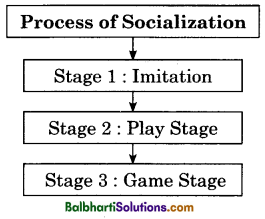By going through these Maharashtra State Board Class 11 Sociology Notes Chapter 6 Socialization students can recall all the concepts quickly.
Maharashtra State Board Class 11 Sociology Notes Chapter 6 Socialization
→ Socialization refers to the lifelong social experience by which human beings are transformed into social beings.
→ Socialization is a process whereby an individual develops one’s personality and becomes a functioning member of society.
→ Hobbs and Blank: ‘Socialization transform the biological organism into a social being’.
→ Socialization transforms the individual self into a social self.
![]()
Socialization:
- A process of learning various form of behaviour acceptable in a particular culture
- An ongoing process of continuous learning
- A process through which an individual gradually becomes member of the society.

Types of Socialization:
- Primary Socialization: The learning which happens in the early years.
- Secondary Socialization: The learning which extends the entire life of a person

Process of Socialization:
George Herbert Mead has elaborated on the process of building social self. According to Mead formation of self occurs in three distinct stages.
Process of Socialization
- Stage 1: Imitation
- Stage 2 : Play Stage
- Stage 3 : Game Stage

![]()
Agencies of Socialization:
The child gradually becomes a member of society by participating in different social groups and networks which can be termed as agencies of socialization.
Agencies of Socialization:
- Family
- Peer groups
- Schools
- Mass Media
- Neighborhood
- Workplace

Re-socialization:
- The individual needs to adapt and cope with new situations and environment sometimes by learning new things or sometimes even by unlearning. This process of unlearning old norms, roles, values and behavioural patterns and learning new patterns is called re-socialization.
- A prison sentence, is a good example, which not only leads to rehabilitation of an individual’s behaviour but also makes them accommodate the new norms.
- Severity of re-socialization depends on the context in which it is carried out.
Total Institution:
- Erving Goffman is credited for having popularized the term ‘total institution’, closely associated with re-socialization.
- Examples of Total Institutions are prisons, military camps, mental health facilities, and private boarding schools.
- Re-socialization is often a deliberate and an intensely social process.